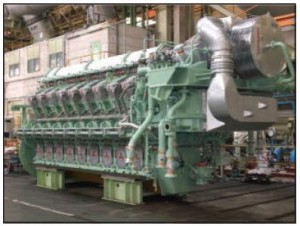UCF takes another step in an attempt at sustainability with the groundbreaking of a giant Mitsubishi engine that runs on natural gas.
The engine itself, which will be located in the central power plant across from the water tower is a 30×10 ft generator that will supply the campus with one third of its total energy by burning natural gas. The new engine is expected to reduce UCF’s environmental impact by 30% and save around 2.5 million dollars in energy costs annually. With the engine’s operation schedules to begin in October of this year, UCF is the first Florida University to invest in natural gas by building its own plant.

The new natural gas engine will be fueled by underground natural gas lines as part of an interstate natural gas transmission line. After the gas is burned, rejected heat will be recaptured and used to fuel an absorption chiller producing 1,000 tons of chilled water for UCF’s underground cooling system. David Norvell, UCF’s Director of Sustainability and Energy Management says that with around 70% of heat energy usually getting dumped back into the environment, the absorption chiller process will make the plant 70-80% more efficient. The system will help support UCF’s future growth.
Because natural gas is found in coal beds, oil fields and natural gas fields, digging usually takes place in ocean floors and deep sedimentary structures. A popular method for obtaining natural gas is Hydraulic Fracturing, commonly referred to as fracking. A few of the common side effects of fracking are contamination of ground water, pollution of air quality, and surface subsidence. In addition, chemicals in fracturing fluid are hazardous to human health, with risks ranging from rashes to cancer.
According to the International Panel on Climate Change, although natural gas processing emits les carbon dioxide into the atmosphere than the burning of other fossil fuels, it still contributes substantially to global warming. IPCC research reveals that although burning natural gas releases smaller amounts of greenhouse gases, the kind that it does release such as ethane and butane, are much more potent than Carbon Dioxide when released into the atmosphere. Predictions from the IPCC Fourth Assessment Report calculate that continuing at the current rate, natural gas emission will rise to 11 billion tons/yr by 2030, as compared to the 5.3 billion tons/yr in 2004.
Governing itself by the United Nation’s definition of sustainability, UCF seeks to make sure our presence on the earth does not negatively affect future generations. Recognizing that natural gas isn’t a final solution to the environmental problem, Norvell states, the new engine is “just one step in our climate action plan to become 100% climate neutral.” According to UCF’s climate action plan carbon dioxide emissions will be reduced 42 percent by 2030 and achievement of 100% climate neutrality by 2050.





